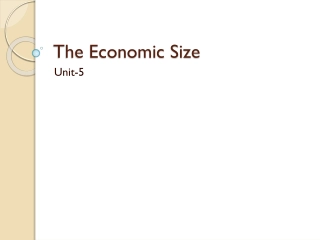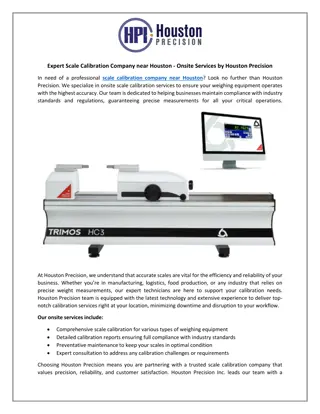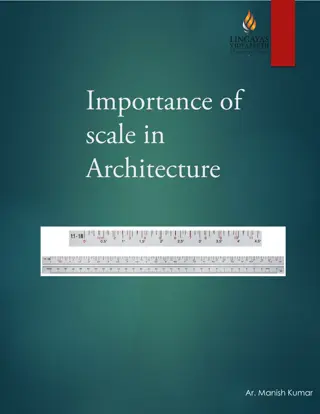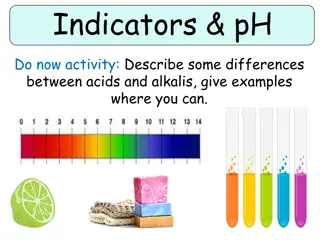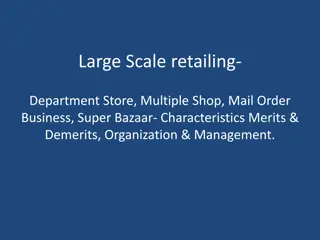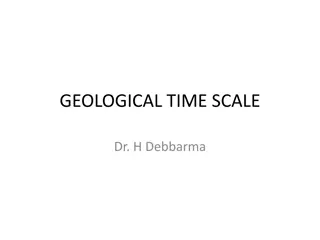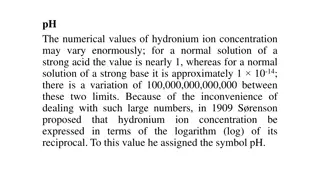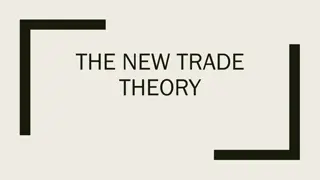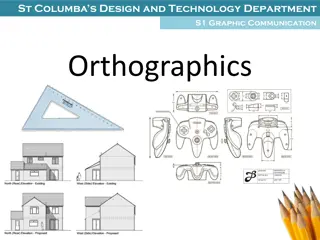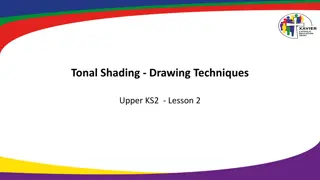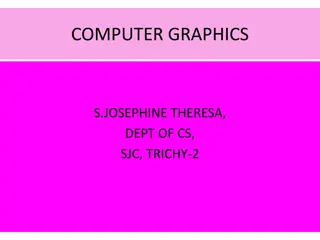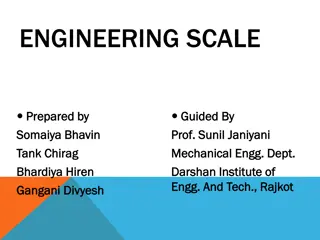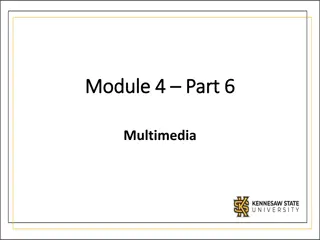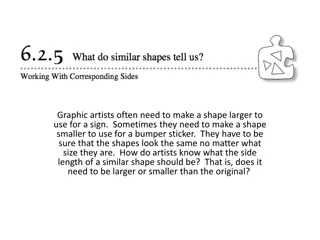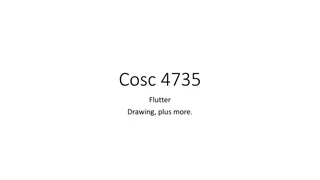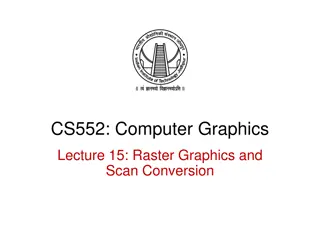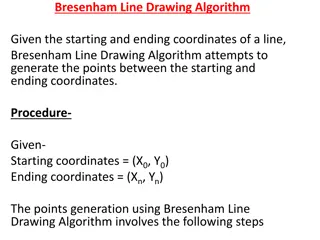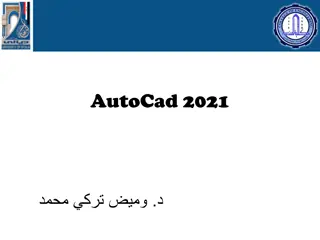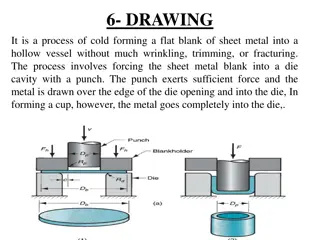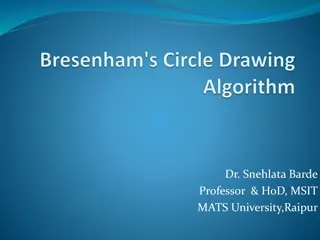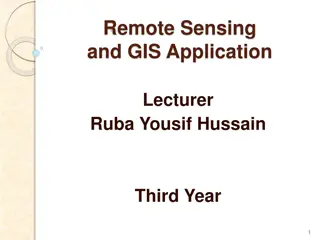The Economic Size
Economies of scale and how it can benefit businesses. Learn about the different types of economies of scale and their effects on production costs. Discover the sources that can help achieve economies of scale.
1 views • 21 slides
Scale Based Regulation 2023 - Non-Banking Financial Company (NBFCs)
On October 19, 2023, the Reserve Bank of India (\u201cRBI\u201d) has issued \u2018Master Direction \u2013 Reserve Bank of India (Non-Banking Financial Company \u2013 Scale Based Regulation) Directions 2023\u2019 (\u2018SBR Master Direction\u2019). The SBR Master Direction aims to harmonize the Previ
0 views • 9 slides
Precision Fermentation in Sustainable Food Production
Precision Fermentation is a specialized bioprocessing technique that utilizes microbes as cell factories to produce specific functional ingredients like proteins, vitamins, enzymes, and more. This innovative technology addresses the challenges of increasing food demands in a sustainable way, offerin
1 views • 12 slides
Understanding Scale Factors and Ratios in Similar Figures
Explore the concept of scale factors and ratios in similar figures through visible learning intentions, warm-up exercises, and practical examples. Learn to determine the scale factor between two similar figures, use scale factors to find missing sides, and apply the knowledge in real-world scenarios
3 views • 13 slides
Expert Scale Calibration Company Near Houston - Onsite Services
In need of a professional scale calibration company near Houston? Look no further than Houston Precision. We specialize in onsite scale calibration services to ensure your weighing equipment operates with the highest accuracy. Our team is dedicated to helping businesses maintain compliance with indu
0 views • 2 slides
Introduction to Spark Streaming for Large-Scale Stream Processing
Spark Streaming, developed at UC Berkeley, extends the capabilities of Apache Spark for large-scale, near-real-time stream processing. With the ability to scale to hundreds of nodes and achieve low latencies, Spark Streaming offers efficient and fault-tolerant stateful stream processing through a si
0 views • 30 slides
Importance and Types of Scale in Architecture
Scale is crucial in architecture for accurate designs and execution. Standard scales are used in architectural drawings to set object sizes, such as human scale and miniature scale. Human scale relates to human dimensions, while miniature scale reduces object sizes. Understanding these scales enhanc
1 views • 6 slides
Understanding Acids and Alkalis: pH Scale and Indicators
Explore the differences between acids and alkalis, learn about indicators, pH scale, and how to categorize solutions as acidic, alkaline, or neutral. Understand the importance of universal indicators in determining acid and alkali strength. Discover the disadvantages of using red and blue litmus pap
3 views • 11 slides
Understanding Large Scale Retailing and Store Classification
Large scale retailing encompasses department stores, multiple shops, mail-order businesses, and super bazaars. It can be classified into store-based and non-store based retailing, further divided based on ownership and merchandise offered. Store-based retailers include independent retailers, chain r
1 views • 16 slides
Understanding the Geological Time Scale and Earth's Evolution
Studying the geological time scale is crucial for comprehending Earth's history, evolution of life, and significant events that shaped our planet. Evidences like field observations, fossil records, and radioactive dating contribute to constructing this vast timeline. Major occurrences such as mass e
1 views • 46 slides
Understanding pH Scale and Hydronium Ion Concentration
The pH scale is a logarithmic measurement that indicates the acidity or alkalinity of a solution based on the concentration of hydronium ions. pH values range from 0 to 14, with 7 being neutral. Lower pH values indicate acidity, while higher values indicate alkalinity. This scale provides a convenie
0 views • 104 slides
The New Trade Theory and Economies of Scale in International Trade
The New Trade Theory, emerged in the 1970s, challenges traditional trade theories by emphasizing the role of increasing returns and economies of scale in international trade. It introduces the concept of industrial organization and imperfect competition to explain how countries trade not only based
0 views • 12 slides
Understanding Acids and Bases: pH Scale Explained
Exploring the pH scale, this content delves into the fundamentals of acidity and alkalinity, covering what pH stands for, the inventor of the pH scale, reactions when acids and bases combine, and where the weakest acids and bases are found on the pH scale.
0 views • 7 slides
Exploring Orthographic Drawing in Design and Technology Education
Delve into the world of orthographic drawing through St. Columba's Design and Technology Department's S1 Graphic Communication program. Discover the significance of orthographics in visualizing 3D objects as 2D drawings, learn about orthographic views like Elevation, Plan, and End Elevation, and exp
0 views • 8 slides
Tonal Shading Drawing Techniques Lesson for Upper KS2
Develop your drawing technique in creating tone with light, medium, and dark tones using cross-hatching, blending, and stippling. Apply these techniques to make objects appear 3D. Explore the importance of tone in drawing, experiment with different shading techniques, and apply them to compositions.
6 views • 6 slides
Pixel Array Status and Drawing Rules for High-Resistivity Epi Design
This collection of images and descriptions provides an overview of the pixel array status as of April 26, 2019, along with drawing rules for high-resistivity epi design. The pixel array features various components such as Pixel_S1, Pixel_S3, and the overall array structure. Drawing rules highlight t
4 views • 9 slides
Understanding Symmetrical DDA and Bresenham's Line Drawing Algorithm
The content discusses the Symmetrical DDA (Digital Differential Analyzer) and Bresenham's Algorithm for line drawing in computer graphics. Symmetrical DDA generates lines from differential equations, while Bresenham's Algorithm iteratively changes coordinate values to draw lines effectively. The pro
0 views • 11 slides
Consultation on 2023/24 Fee Scale by PSAA: Key Points and Deadlines
PSAA is conducting a crucial consultation to set the fee scale for 2023/24, involving elements like audit fees, legal framework, and consultation details with stakeholders. The process includes setting scale fees, handling fee variations, adhering to statutory roles, and addressing the audit backlog
0 views • 30 slides
Engineering Scale and Different Types of Scales
Engineering scale plays a crucial role in reducing or enlarging dimensions of large or tiny objects to fit standard size drawing sheets. This article covers the concept of reducing scale, representative factor, types of scales like plain, diagonal, vernier, and more, along with detailed construction
0 views • 11 slides
Exploring Drawing Capabilities in Pygame: Shapes, Multimedia, and More
Utilize Pygame to go beyond drawing rectangles and explore drawing circles, lines, shapes of any format, and importing images. Enjoy playing music and multiple sounds simultaneously. Learn about useful functions in the Draw module and how to draw various shapes onto Surfaces using parameters and fun
0 views • 26 slides
Understanding Scale Factors and Similar Shapes in Graphic Design
Graphic artists often need to resize shapes for different purposes while ensuring they maintain their original proportions. This involves determining the scale factor between similar shapes, understanding how to find the scale factor using corresponding sides, and dealing with scenarios where sides
0 views • 8 slides
Understanding Horizontal Boundaries of Firms in Economics
Exploring the concept of horizontal boundaries in firm behavior, this lecture delves into Long-run Average Cost curve, economies and diseconomies of scale, optimal plant size, and the Minimum Efficient Scale. It discusses how economies of scale affect production costs and the relationship between ma
0 views • 25 slides
WMO Scale of Assessment and Working Capital Fund
The WMO Scale of Assessment for members' contributions and the Working Capital Fund is based on the United Nations Scale, adjusted for differences in membership every 3 years. The latest scale approved by EC-75 for 2023 uses the UN scale from December 2021. The rates for 2026-2027 will be determined
0 views • 9 slides
Creating Interactive Drawing App in Flutter
Learn how to create an interactive drawing app in Flutter using GestureDetector for touch input, CustomPaint for rendering, and storing drawing information dynamically. Implement features like color selection, line width adjustment, and gesture detection to enable users to draw on the screen efficie
0 views • 19 slides
Introduction to Engineering Drawing and Techniques
Engineering drawing is a fundamental aspect of communicating ideas and designs in the fields of Mechanical, Electrical, and Civil Engineering. This form of visual communication utilizes lines to represent object surfaces, edges, and contours. Various drawing methods such as Freehand, Instrument-base
0 views • 55 slides
Introduction to Engineering Drawing Language and Drawing Tools
Engineering Drawing Language uses lines to depict object surfaces, edges, and contours, while Freehand Drawing is sketched without instruments. Drawing Instruments ensure precise drawings to scale. Learn to draw horizontal and vertical lines, and angles using drawing tools like T-Square and triangle
0 views • 29 slides
Nature Drawing Tasks for Art Class
Complete a series of nature drawing tasks including recreating shells, creating skull drawings, experimenting with mark making techniques, and working on charcoal drawings. Reflect on your work to improve and develop your drawing skills further.
0 views • 6 slides
Understanding Pressure Ulcer Risk Assessment with the Braden Scale
Pressure ulcer risk assessment is crucial in healthcare settings to identify individuals at risk of developing pressure ulcers. The Braden Scale, developed in 1984, evaluates six key elements contributing to pressure ulcer development. It provides a standardized method for assessing risk levels base
0 views • 20 slides
Raster Graphics and Scan Conversion in Computer Graphics
This lecture covers various topics related to raster graphics and scan conversion in computer graphics. It includes issues with scan converting a line, generalized line drawing algorithms, and the midpoint circle drawing algorithm. Additionally, it explores deriving mathematical expressions for draw
0 views • 21 slides
Bresenham Line Drawing Algorithm Explained with Examples
Bresenham Line Drawing Algorithm is a method used to generate points between starting and ending coordinates to draw lines efficiently. This algorithm involves calculating parameters, decision parameters, and iteratively finding points along the line. Two example problems are provided with step-by-s
0 views • 8 slides
Master AutoCAD 2021 Drawing Tools and Techniques
Explore the powerful features of AutoCAD 2021 including drawing tools for setting limits, line weight adjustments, hatch tool for generating hatch lines, and gradient application. Learn how to set drawing limits, customize line weights, and optimize your drawings efficiently in AutoCAD. The tutorial
0 views • 8 slides
Exploring Psychology: Insights into Behavior and Intelligence
Dive into the intriguing world of psychology, analyzing behaviors like drawing a pig and interpreting intelligence scales like the Stanford-Binet Scale. Understand the implications of drawing styles, IQ levels, and the essence of psychology as the study of behavior and mental processes.
0 views • 19 slides
Comparing Scale-Up vs. Scale-Out in Cloud Storage and Graph Processing Systems
In this study, the authors analyze the dilemma of scale-up versus scale-out for cloud application users. They investigate whether scale-out is always superior to scale-up, particularly focusing on systems like Hadoop. The research provides insights on pricing models, deployment guidance, and perform
0 views • 27 slides
Metal Drawing Process for Creating Hollow Vessels
Metal drawing is a cold forming process that transforms a flat sheet metal blank into a hollow vessel without wrinkles or fractures. By applying force with a punch, the metal is drawn into a die cavity to shape the blank into a cup-like form. This process involves setup similar to blanking but with
0 views • 19 slides
Bresenham's Circle Drawing Algorithm Explained
Bresenham's Circle drawing algorithm is a fast and efficient method for drawing circles using integer arithmetic. It divides the circle into octants and selects the nearest pixel positions to create smooth arcs. This algorithm is widely used for graphics applications due to its speed and accuracy.
0 views • 15 slides
Remote Sensing and GIS Applications in Photogrammetry: Understanding Scale Variations
Exploring the fundamental principles of photogrammetry in remote sensing and GIS applications, this content delves into the science of measurements from aerial photographs. It discusses the implications of scale differences on maps and aerial photographs, emphasizing the variations in scale due to t
0 views • 19 slides
PrEP Scale Up in Kenya: Bridge to Scale Project Overview
PrEP Scale Up in Kenya: Bridge to Scale Project sessions in 2017 discussed the National HIV Prevalence, PrEP journey, TWG composition, milestones, sub-committees, and outputs focusing on scaling up PrEP as an effective HIV-prevention intervention.
0 views • 20 slides
Understanding Scale Drawings and Compass Points
Learn to interpret information from problems, create scale drawings, solve real-life problems using scale drawings, understand compass points, and follow directions accurately. Practice solving problems involving scale drawings, bearings, compass points, and map directions to enhance your spatial sk
0 views • 19 slides
Scale Learning Adventures: Movie Magic and Visible Learning
Embark on a journey of scale learning through engaging activities such as Butterfly Scale Warm-up, Hobbit Holes and Hogwarts exploration, and applying knowledge at Hagrid's Shack. Discover how scale is used in real-life situations and solve problems using ratios with success criteria in mind.
0 views • 10 slides
Developing Drawing Techniques for Tone in Lower KS2 - Lesson 2
In this lesson, students will enhance their drawing skills by experimenting with techniques such as cross-hatching, blending, and stippling to create tone. They will learn about key terms like light, medium, dark, shadow, and highlight, and engage in activities that help them understand the importan
0 views • 5 slides
